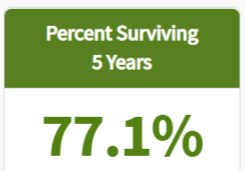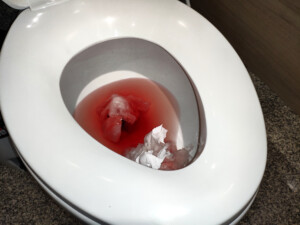If you see blood in your urine and it’s from bladder cancer, would it necessarily keep showing with every single void thereafter?
Or should you stop worrying if you’ve gone two weeks without seeing blood in your urine?
A tumor can bleed, and this is how blood would mix in with your urine.
Once the cancer begins bleeding, would it always be in a bleeding state, and hence, nearly all of your subsequent voids would present with discoloration caused by blood?
Hematuria is the name for blood in the urine. When it’s called gross hematuria, this means it can be seen with the naked eye.
“Hematuria caused by bladder cancer is usually intermittent and is likely to appear red or pink,” says Kiarash Michel, MD, a urologic oncological surgeon with Cedars Sinai who specializes in robotic surgery, and is cofounder of MDbio, a plant-based medicine company.
Dr. Michel adds, “It is possible that there is variety from patient to patient in terms of how often blood in the urine would be detectable to the naked eye.”
In fact, if you detect hematuria, and it’s from bladder cancer, a few months may go by before the next time you see it – even if you get a good look at every single void, including overnight.
When bladder cancer is caught early, the prognosis is excellent. Do NOT delay seeing a urologist if you fear that you might have bladder cancer.
Blood in the urine does not mean that the cancer is advanced (spread beyond the bladder). It may still be in a highly curable stage.
Even if you don’t have other symptoms (painful urination, groin pain, weak urine stream, increased urgency and continuing to feel urgency despite having just voided), you should always promptly see a doctor if you think your urine might have blood in it.

Bladder cancer fact according to the National Cancer Institute
A urinary tract infection (UTI) can cause visible blood.
Though a UTI sounds harmless compared to bladder cancer, it can actually spread to the kidneys and become life threatening if not treated promptly.
Beets can make your urine pink or reddish. This is called beeturia.
If the color persists after several days, though, without having eaten more beets, it’s probably not from beets. See your doctor.
 Dr. Michel is a leading physician in prostate cancer therapy, urological cancers, benign prostatic hyperplasia, female urology, urinary disorders, incontinence, erectile dysfunction, stone diseases and anti-aging. MDbio provides safe non-pharmaceutical alternatives to maximizing overall health and wellbeing.
Dr. Michel is a leading physician in prostate cancer therapy, urological cancers, benign prostatic hyperplasia, female urology, urinary disorders, incontinence, erectile dysfunction, stone diseases and anti-aging. MDbio provides safe non-pharmaceutical alternatives to maximizing overall health and wellbeing.
 Lorra Garrick has been covering medical, fitness and cybersecurity topics for many years, having written thousands of articles for print magazines and websites, including as a ghostwriter. She’s also a former ACE-certified personal trainer.
Lorra Garrick has been covering medical, fitness and cybersecurity topics for many years, having written thousands of articles for print magazines and websites, including as a ghostwriter. She’s also a former ACE-certified personal trainer.
.



























